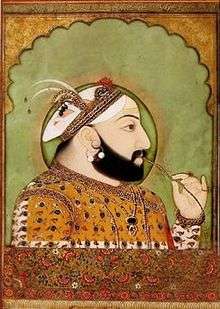Battle of Khatoli
| Battle of Khatoli/Ghatoli[1] | |||||||||
|---|---|---|---|---|---|---|---|---|---|
| Part of Rajput-Afghan wars | |||||||||
 Rana Sanga Leader of the Rajput Confederation | |||||||||
| |||||||||
| Belligerents | |||||||||
|
| Lodi dynasty | ||||||||
| Commanders and leaders | |||||||||
| Rana Sanga (WIA) | Ibrahim Lodi | ||||||||
On the death of Sikander Lodi in A.D. 1517, his son Ibrahim Lodi succeeded him. He was engaged in putting down the revolts of his nobles, when news of Rana Sangas encroachments reached him. He prepared an army and marched against Mewar. The Maharana advanced to meet him and the two armies met near the village of Khatoli on the borders of Haravati (Haraoti). The Delhi army could not stand the onslaught of the Rajputs, and after a fight lasting two pahars (5 hours), it gave way and fled, followed by the Sultan himself, leaving a Lodi prince prisoner in the hands of Sanga. The prince was released after a few days on payment of a ransom. In this battle, the Maharana lost an arm by a sword cut, and an arrow made him lame for life.[2][3]
Aftermath
The resources of Ibrahim were so crippled by this war with Sanga that he could not renew the contest for some time. However, he carefully nursed his desire to be revenged on Maharana Sanga for the disastrous defeat inflicted by the latter at Khatoli. And when the rebellion of Islam Khan, which had assumed serious proportions,was suppressed, the Sultan began to prepare an army to attack Mewar but was once again defeated in the Battle of Dholpur.[4]
References
- 1 2 3 Chandra, Satish (2004). Medieval India: From Sultanat to the Mughals-Delhi Sultanat (1206-1526) - Part One. Har-Anand Publications. p. 224. ISBN 8124110646.
- ↑ Duff's Chronology of India, p. 271 Archived December 8, 2015, at the Wayback Machine.
- ↑ Decisive Battles India Lost (326 B. C. to 1803 A. D.) pg 56
- ↑ The Hindupat, the Last Great Leader of the Rajput Race. 1918. Reprint. London pg 60